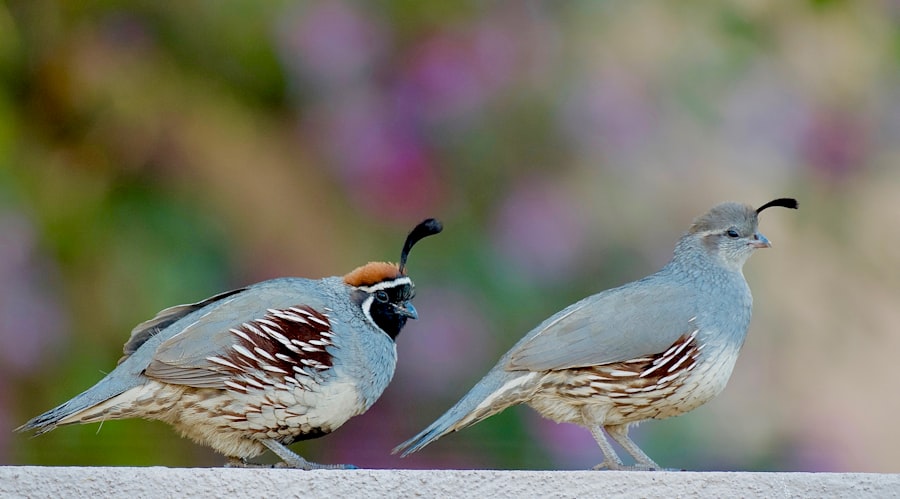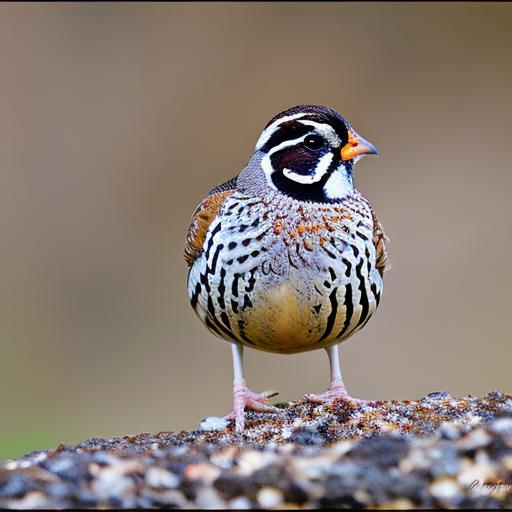Quails are small, ground-dwelling birds that are known for their social nature and tendency to form flocks. Understanding their behavior is crucial for providing them with the best care and living conditions. Quails are known to be active during the day, foraging for food and dust bathing. They are also known to be very social birds, often forming close-knit groups within their flock. Additionally, quails are known to be easily stressed by loud noises and sudden movements, so it’s important to create a calm and peaceful environment for them.
Quails are also known for their nesting behavior, with females typically laying their eggs in hidden, secluded areas. Understanding these natural behaviors can help in providing the right kind of shelter and nesting boxes for them. By understanding quail behavior, you can create an environment that meets their natural instincts and needs, leading to healthier and happier birds.
Key Takeaways
- Quail are social birds and thrive in groups, so understanding their behavior is crucial for their well-being.
- Providing adequate space and shelter is essential for quail to exhibit natural behaviors and reduce stress.
- Minimizing stress factors such as loud noises and sudden movements is important for the health and productivity of quail.
- Implementing quiet feeding and watering systems can help reduce stress and promote a calm environment for quail.
- Using soundproofing and dampening techniques in the quail housing area can further reduce stress and promote a peaceful environment.
Providing Adequate Space and Shelter
When it comes to housing quails, providing adequate space and shelter is crucial for their well-being. Quails are active birds that require space to move around and forage for food. Overcrowding can lead to stress and aggression among the birds, so it’s important to provide enough space for them to roam freely. Additionally, quails need shelter to protect them from predators and the elements. This can be in the form of a coop or aviary that provides protection from rain, wind, and extreme temperatures.
Nesting boxes are also essential for quails, as they provide a safe and secluded space for females to lay their eggs. These boxes should be placed in a quiet and secluded area to mimic their natural nesting habits. Providing adequate space and shelter for quails is essential for their physical and mental well-being, and can contribute to healthier and more productive birds.
Minimizing Stress Factors
Quails are sensitive birds that can easily become stressed by various factors in their environment. Loud noises, sudden movements, overcrowding, and changes in their routine can all contribute to stress in quails. It’s important to minimize these stress factors as much as possible to ensure the well-being of the birds. This can be done by providing a calm and quiet environment, avoiding sudden changes in their living conditions, and ensuring that they have enough space to move around freely.
Additionally, providing enrichment activities such as dust baths, perches, and hiding spots can help reduce stress and boredom in quails. By minimizing stress factors, you can create a more comfortable and harmonious environment for your quails, leading to healthier and happier birds.
Implementing Quiet Feeding and Watering Systems
Quails are easily startled by loud noises, so it’s important to implement quiet feeding and watering systems to minimize stress in the birds. This can be achieved by using feeders and waterers that are designed to reduce noise, such as gravity-fed or automatic systems. These systems can help ensure that quails have access to food and water without being disturbed by loud clanging or banging noises.
Additionally, placing feeders and waterers in quiet and secluded areas can help create a calm and peaceful feeding environment for the birds. By implementing quiet feeding and watering systems, you can help reduce stress in quails and create a more comfortable living environment for them.
Using Soundproofing and Dampening Techniques
In addition to implementing quiet feeding and watering systems, using soundproofing and dampening techniques can help create a more peaceful environment for quails. This can be achieved by using materials such as foam insulation, acoustic panels, or soundproofing curtains to reduce noise levels in the quail housing area. These materials can help absorb sound and minimize echoes, creating a quieter and more calming environment for the birds.
Dampening techniques such as using rubber mats or soft bedding can also help reduce noise levels and create a more comfortable living space for quails. By using soundproofing and dampening techniques, you can help minimize stress in quails and create a more peaceful environment for them to thrive.
Establishing a Consistent Routine

Quails thrive on routine and consistency, so it’s important to establish a regular schedule for feeding, cleaning, and other daily activities. This can help reduce stress in the birds by providing them with a sense of predictability and stability in their environment. By establishing a consistent routine, you can help create a calm and harmonious living environment for your quails.
Additionally, providing enrichment activities such as dust baths, perches, and hiding spots at consistent times can help keep the birds engaged and stimulated. By establishing a consistent routine, you can help reduce stress in quails and create a more comfortable living environment for them.
Seeking Professional Advice and Support
If you’re new to raising quails or are experiencing challenges with your current setup, seeking professional advice and support can be incredibly beneficial. There are many resources available, including books, online forums, and local agricultural extension offices that can provide valuable information and guidance on raising quails. Additionally, reaching out to experienced quail breeders or veterinarians can provide personalized advice tailored to your specific situation.
Professional support can also be invaluable when it comes to identifying and addressing any health or behavioral issues that may arise in your quail flock. By seeking professional advice and support, you can gain the knowledge and confidence needed to provide the best care for your quails and ensure their well-being.
In conclusion, understanding quail behavior, providing adequate space and shelter, minimizing stress factors, implementing quiet feeding and watering systems, using soundproofing and dampening techniques, establishing a consistent routine, and seeking professional advice and support are all essential components of creating a healthy and harmonious environment for quails. By taking these factors into consideration, you can ensure the well-being of your quail flock and create a comfortable living space where they can thrive.
If you’re looking for tips on how to keep quail quiet, you might also be interested in creating a peaceful environment for your poultry. Check out this informative article on choosing the right flooring for your chicken coop. Just like with quail, providing a comfortable and stress-free space for your chickens can help minimize noise and ensure their well-being.
FAQs
What are some ways to keep quail quiet?
Some ways to keep quail quiet include providing enough space for them to roam, keeping them well-fed and providing them with plenty of hiding spots.
Why is it important to keep quail quiet?
Keeping quail quiet is important to prevent stress and anxiety in the birds, as well as to maintain a peaceful environment for yourself and your neighbors.
What are some environmental factors that can affect quail noise levels?
Environmental factors that can affect quail noise levels include overcrowding, lack of hiding spots, and disturbances such as loud noises or sudden movements.
Are there any specific breeds of quail that are quieter than others?
Some quail breeds are known to be quieter than others, such as the Coturnix quail, which is often preferred for its relatively quiet nature.
What are some tips for keeping quail quiet in an urban setting?
In an urban setting, it’s important to provide quail with enough space, keep them well-fed, and provide them with plenty of hiding spots to help keep them quiet. Additionally, consider using soundproofing materials in their enclosure to minimize noise.
Meet Walter, the feathered-friend fanatic of Florida! Nestled in the sunshine state, Walter struts through life with his feathered companions, clucking his way to happiness. With a coop that’s fancier than a five-star hotel, he’s the Don Juan of the chicken world. When he’s not teaching his hens to do the cha-cha, you’ll find him in a heated debate with his prized rooster, Sir Clucks-a-Lot. Walter’s poultry passion is no yolk; he’s the sunny-side-up guy you never knew you needed in your flock of friends!







